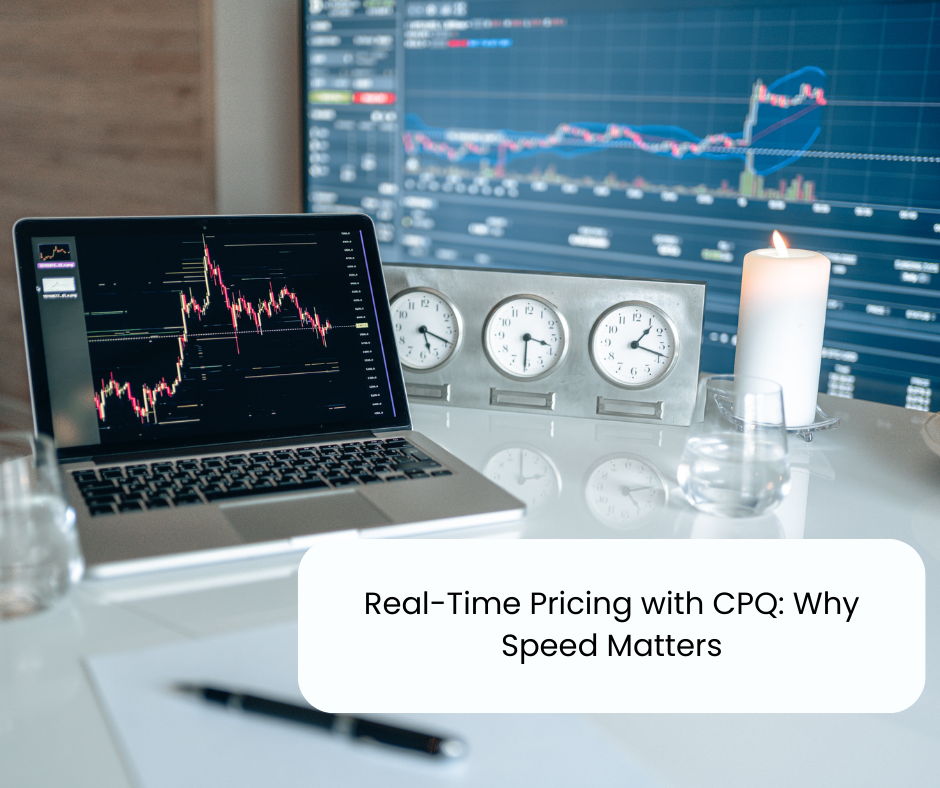Notifications

8 minutes, 48 seconds
-24 Views 0 Comments 0 Likes 0 Reviews

In the fast-paced world of sales and commerce, speed is more than just a competitive advantage—it’s a necessity. Buyers expect quick responses, personalized experiences, and seamless transactions. This expectation is driving the adoption of real-time pricing within CPQ (Configure, Price, Quote) systems, which offer organizations the ability to deliver accurate, dynamic pricing instantly. But why does speed matter so much in CPQ? Let’s explore how real-time pricing enhances the sales process and why it's critical in today’s marketplace.
CPQ (Configure, Price, Quote) software helps companies streamline the sales process by automating the configuration of complex products, pricing them accurately, and generating professional quotes. It’s especially useful in B2B industries like manufacturing, software, and telecommunications, where product customization is common and pricing can be complicated.
Real-time pricing refers to the ability of a CPQ system to fetch and display current prices instantly, based on variables such as inventory, market demand, customer profile, region, and more. This pricing data is typically pulled from integrated ERP or CRM systems and updated dynamically, reducing delays and manual errors.
Today’s customers—both B2B and B2C—expect immediate results. If they have to wait for hours or even days for a quote, you risk losing the deal to a faster competitor. Instant gratification, fostered by eCommerce and digital tools, has shaped buying behavior. A CPQ system with real-time pricing responds to this demand by offering fast, accurate quotes.
Speed isn’t just a response to customer demands; it’s a strategic differentiator. The faster you can get a tailored, accurate quote into a customer’s hands, the more likely you are to win the deal. In industries where margins are tight and competition fierce, being able to respond faster than your competitors can make all the difference.
Traditional quoting methods involve checking multiple systems or spreadsheets to determine price, which can take hours or days. Real-time CPQ eliminates these bottlenecks by automatically fetching the latest data and applying relevant pricing rules. Sales reps can provide quotes on the spot, even during customer meetings.
Manual pricing methods often lead to errors, which can damage customer trust or cut into profit margins. With real-time pricing, you ensure that all discounts, promotions, and cost variables are up-to-date. This reduces the chance of human error and guarantees that quotes are both competitive and profitable.
Markets change rapidly. With real-time pricing, your sales team can instantly reflect those changes in their quotes. Whether it's fluctuating raw material costs or competitor price adjustments, your pricing can stay aligned with market conditions, improving your agility and competitiveness.
Customers value speed and transparency. When they receive a fast, accurate quote, they’re more likely to trust your brand and proceed with the purchase. Real-time pricing gives them confidence that they’re getting the best deal at that moment.
In SaaS and telecom, pricing often depends on usage tiers, licensing models, or add-on features. Real-time CPQ systems can dynamically generate pricing based on customer selections and account history, enabling tailored subscription models.
In industries where raw material costs fluctuate, having access to up-to-date pricing is essential. Real-time CPQ allows manufacturers to quote prices that reflect current supply chain realities, reducing the risk of under- or overpricing.
For businesses that offer complex or custom products, real-time pricing allows customers to see price adjustments immediately as they configure different features or specifications—creating a more interactive and informative buying experience.
Real-time pricing requires seamless integration with ERP, CRM, and inventory systems. Poor integration can cause data inconsistencies or delays. Ensuring your systems are interoperable is key to unlocking the full benefits of real-time CPQ.
Real-time systems are only as good as the data they rely on. Inaccurate or outdated information can lead to pricing errors. Establishing robust data governance practices is critical to maintaining trust in your pricing models.
Fetching real-time data can strain system performance, especially during peak usage. Businesses must ensure that their CPQ platform is built to scale and handle large volumes of requests without latency.
Keep your pricing rules and logic in a centralized engine to avoid discrepancies. This makes it easier to maintain and update pricing across all channels and regions.
Speed doesn’t just come from automation—it also comes from eliminating delays. Automating approval workflows for discounts or special pricing can further reduce the time to quote.
Give customers or sales reps access to guided selling and self-service portals with real-time pricing. This empowers users to generate their own quotes without waiting on internal processes.
Track key metrics like quote turnaround time, pricing accuracy, and deal closure rate. Use these insights to continuously refine pricing strategies and system performance.
As artificial intelligence and machine learning continue to evolve, CPQ systems are becoming more intelligent. Predictive pricing—where the system suggests optimal price points based on historical data, competitor pricing, and customer behavior—is the next frontier. Real-time pricing will increasingly leverage AI to become not just fast, but also strategically smart.
In a world where decisions are made in seconds and loyalty is fleeting, speed is no longer optional. Real-time CPQ pricing systems empowers businesses to respond instantly, price accurately, and win deals faster. Whether you're selling complex machinery or digital subscriptions, implementing real-time pricing could be the competitive edge your business needs.
Investing in a robust CPQ system with real-time pricing capabilities is not just about technology—it's about aligning with modern buyer expectations and building a responsive, agile sales strategy. In the race to win customers, those who quote fastest, win first.

